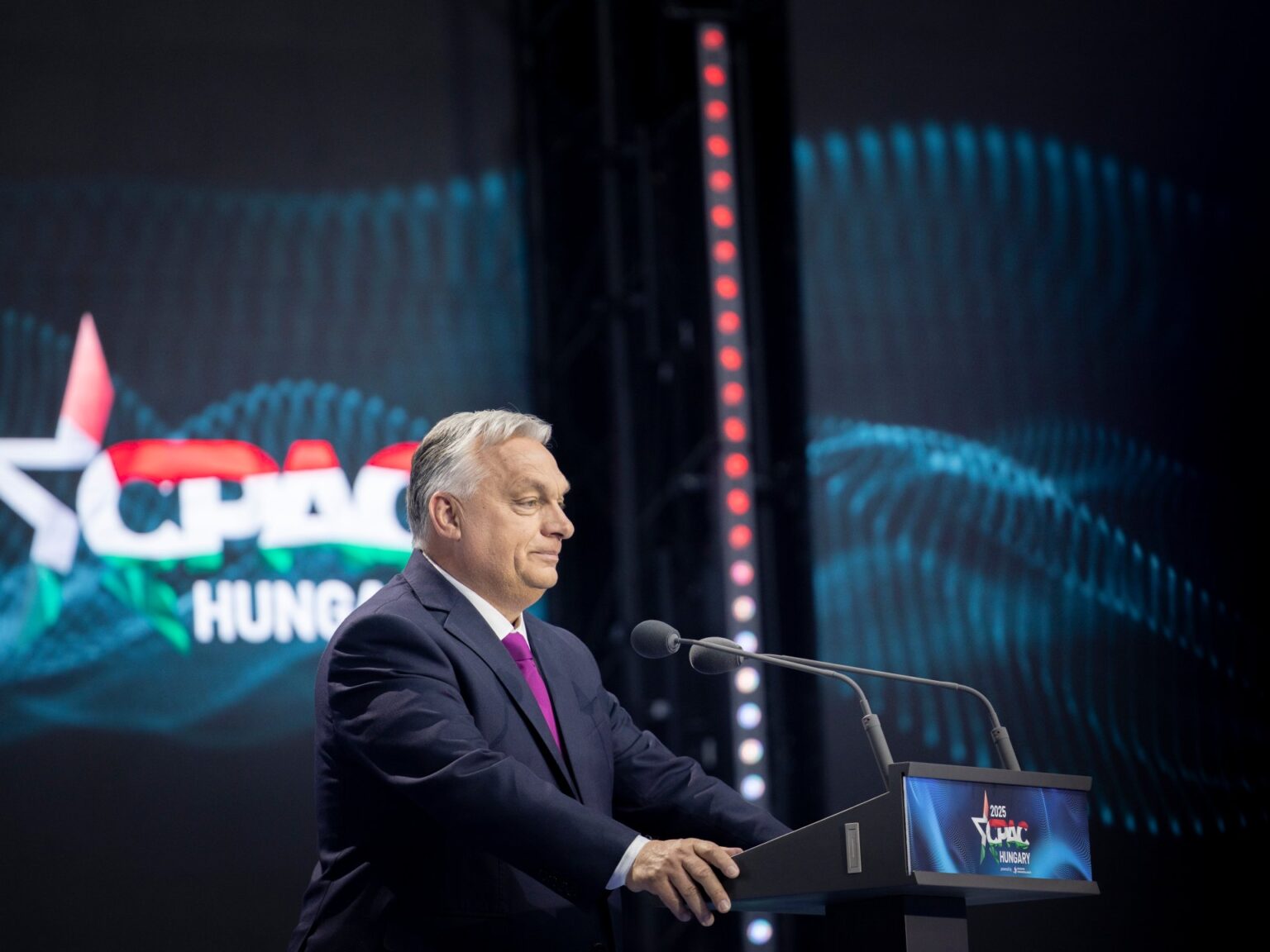As pressure mounts from the EU and his domestic rivals, Hungary’s prime minister is rallying allies to paralyse European institutions.
A “Trump tornado” has swept the globe, bringing with it a wave of “hope” for a return to “normalcy and peace.” So declared Hungarian Prime Minister Viktor Orban in a strikingly blunt keynote speech at this year’s Conservative Political Action Conference (CPAC) in Budapest.
Originally a platform for United States Republican Party politicians and theorists, CPAC has, in recent years, evolved into a global forum for radical right-wing forces. Its arrival in Europe was facilitated by the Foundation for Fundamental Rights – a government-organised NGO backed and funded by the Orban administration.
While Orban lavished praise on Donald Trump, this year’s CPAC had a distinctly European focus. After 15 years in power, Orban faces growing opposition at home. Public frustration over entrenched corruption, economic stagnation and increasingly hostile relations with Hungary’s allies has eroded his popularity. A newly emergent opposition movement, led by former Fidesz insider Peter Magyar, is now polling 6 – 8 percentage points ahead of Orban’s Fidesz–KDNP coalition, posing a serious challenge ahead of the 2026 general election.
In response, the government has ramped up attacks on dissent. Fidesz recently introduced a series of sweeping legislative proposals that threaten opposition politicians, independent media, NGOs and private businesses with Russian-style crackdowns. June’s LGBTQ+ Pride march in Budapest was among the first casualties – banned on the grounds of “child protection”. Alongside these measures, the government has begun rewriting electoral laws and funnelling state resources towards potential Fidesz voters.
Alarmed by Orban’s escalating authoritarianism, 20 European Union member states this week issued a joint declaration urging him to reverse the new measures. They called on the European Commission to deploy the full range of rule-of-law mechanisms should the laws remain in place. Orban’s behaviour is no longer just a domestic matter. His confrontational, transactional approach increasingly paralyses EU decision-making – a luxury the continent can ill afford amid intensifying challenges from Russia, China and the second Trump administration. European unity is not merely a motor of prosperity; it is a cornerstone of collective security.
The Article 7 process – a rarely used EU mechanism that can strip a member state of voting rights for violating fundamental values – was triggered by the European Parliament in 2018 due to concerns over judicial independence and media freedom in Hungary. While the European Council has discussed the matter eight times, it has yet to move forward with a vote on sanctions. That may soon change as tensions continue to mount.
CPAC 2025 thus served as a strategic platform for Orban to consolidate and expand a coalition of radical right-wing Central European leaders – particularly those with a realistic shot at gaining or retaining power. His aim: to forge a bloc capable of obstructing any EU efforts to sanction his government, whether by suspending voting rights or slashing financial transfers. The EU is already withholding over 20 billion euros ($23bn) in structural funds from Hungary – a figure that could rise, creating a serious political liability for Orban ahead of the 2026 elections.
Orban’s ambition is to entrench support among regional allies – and it is telling that the governments of Bulgaria, Croatia, Italy, Poland, Romania and Slovakia have yet to join the growing list of countries condemning Hungary’s recent democratic backsliding. Through CPAC, the Visegrad Group – a longstanding alliance between Hungary, Poland, Slovakia and the Czech Republic — and the “Patriots for Europe” group – a far-right alliance in the European Parliament launched by Orban and allies in 2024 – the Hungarian leader is laying the foundations for a counterweight bloc designed to frustrate EU countermeasures.
This makes the presence of Slovak Prime Minister Robert Fico and Poland’s Mateusz Morawiecki – of the Law and Justice (PiS) party – at this week’s event especially significant. While neither of their parties belongs to the Patriots group in the European Parliament, they remain political allies with growing mutual dependence.
Orban has developed a near cult-like following on the European far right: he consistently wins elections, offers a ready-made ideological narrative, and has poured resources into building a pan-European coalition. But his greatest limitations are Hungary’s small size and his own deepening isolation from the European mainstream. Should far-right parties enter government elsewhere in Europe, they may opt to distance themselves from Orban – as Italy’s Giorgia Meloni has already done.
CPAC underscored the scale of Orban’s effort to preserve the influence he has worked so hard to build. He cannot take on the EU alone. He needs allies if he is to realise his vision of “occupying Brussels” and unleashing his own “tornado” of “civility” across Europe. The Patriots group, Hungary’s Visegrad neighbours and a Trump-led Washington may yet serve as vehicles for that ambition – and for Orban’s own political survival.
The views expressed in this article are the author’s own and do not necessarily reflect Al Jazeera’s editorial stance.
https://www.aljazeera.com/opinions/2025/6/6/to-survive-orban-is-plotting-a-far-right-takeover-of-brussels?traffic_source=rss


